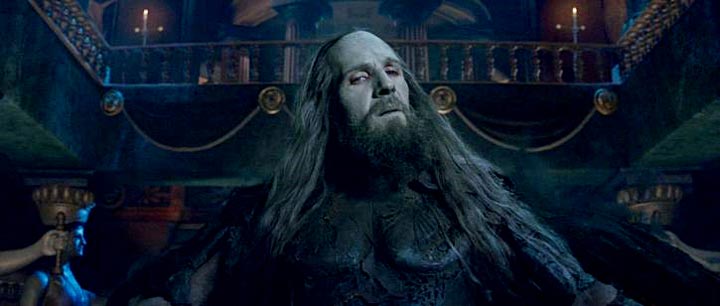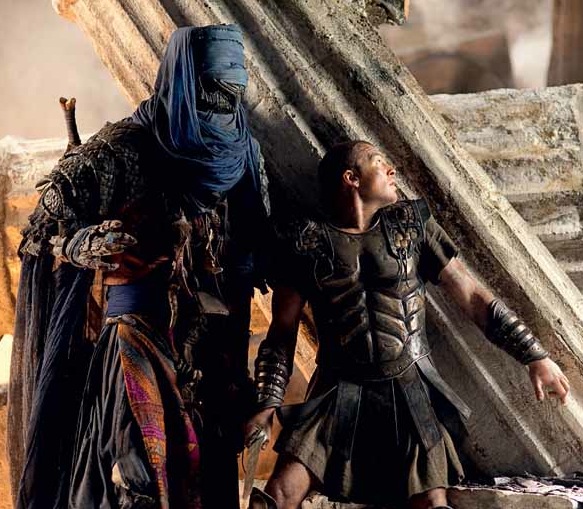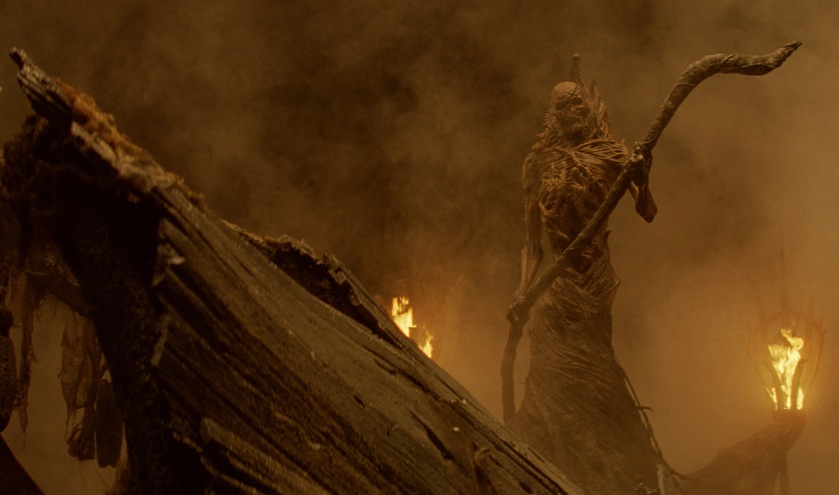Weak God, Limp Lucifer & Wooden Jesus
 Although we discussed imperfect Greek gods, and modern myths of a “more fallible Creator” in the last post, the new Clash of the Titans DOES stray from classic polytheism and polarizes the war between Zeus and Hades; save for a few scenes, the rest of the pantheon is scarce. It’s a much more westernized, even semi-Christianized relationship, akin to Yahweh and Lucifer, God and Satan from the Bible.
Although we discussed imperfect Greek gods, and modern myths of a “more fallible Creator” in the last post, the new Clash of the Titans DOES stray from classic polytheism and polarizes the war between Zeus and Hades; save for a few scenes, the rest of the pantheon is scarce. It’s a much more westernized, even semi-Christianized relationship, akin to Yahweh and Lucifer, God and Satan from the Bible.
The way Hades skulks around at Zeus’ feet on Olympus – accusing mankind like the devil impugning Job – working a rebellious treachery that he thinks he can win, deceiving Zeus… it mimics something many quasi-affiliated “cultural Christians” can grasp. The original Clash involved Aphrodite and others in the schemes and shenanigans, but in 2010 they are barely in frame. Of course, biblically God and Satan are not brothers, not equals, and the parallel falls WELL short (as should be expected). It’s an odd hybrid to bridge the massive cultural gap between Greek myths and popular religious imagery, and instead of a capricious, bickering assemblage we have something closer to the classic “good versus evil” story.
Still… that being the case, the demigod Perseus wants nothing to do with either of them.
Perseus: “If I do this, I do it as a man.”
Draco: “But you are not JUST a man!”
 The interaction between father Zeus and Perseus is odd, to say the least, and this is where the movie’s message gets the most muddied. If the film is trying to say Perseus is correct in his rejection of the gods, then this is betrayed by both his need of Zeus-given gifts to prevail… and his eventual acceptance of those offerings. By the end of the film, he’s wooed into admitting some need, and maintaining a tenuous relationship with his “father god” (though it still seems to be on his terms).
The interaction between father Zeus and Perseus is odd, to say the least, and this is where the movie’s message gets the most muddied. If the film is trying to say Perseus is correct in his rejection of the gods, then this is betrayed by both his need of Zeus-given gifts to prevail… and his eventual acceptance of those offerings. By the end of the film, he’s wooed into admitting some need, and maintaining a tenuous relationship with his “father god” (though it still seems to be on his terms).
The idea that God and man are equally forced to admit “some” reliance on each other is a pretty wimpy statement on the God/human condition. Sometimes when you try to offend no one, you just make EVERYone roll their eyes. It’s like Homer Simpson on Unitarians: “If that’s the one true faith, I’ll eat my hat.”
Lo (speaking to Perseus): “Neither god, nor man… you can change everything…”
It’s curious to see how this story tries to make the savior some kind of “inbetweener”, some kind of mediating force. There is an idea that somehow this incarnate, god-like hero may be the way to bring things back together. In vampire fiction we have Blade – half human, half vampire – more powerful than humans but able to “walk in the light” – and in Greek myths we have demigods. They all seem to be pale (or bronzed) imitations of a hero we’d like to see mend that relationship between man and God and address the sometimes-confusing rift that exists. A Christian knows where I’m going with this… while false gods and vampire comics are all fiction, and sometimes focused on to the point of worship, they all can hint at (or distract from) the common hope I believe finds reality in someone full and real.
 Instead of “neither god nor man” or demi-god “half-god, half-man”… Scripture’s screenplay reveals Jesus as “fully God, fully man”, mediating relationship between righteous God and fallen man, and ultimately restoring the “order of things”. The Christ crushes the head of Hades, who is not “fellow god” but fallen angel (even in Clash, devilish Hades has dark wings that spread ominously) and Jesus has a perfect relationship with his Father in heaven.
Instead of “neither god nor man” or demi-god “half-god, half-man”… Scripture’s screenplay reveals Jesus as “fully God, fully man”, mediating relationship between righteous God and fallen man, and ultimately restoring the “order of things”. The Christ crushes the head of Hades, who is not “fellow god” but fallen angel (even in Clash, devilish Hades has dark wings that spread ominously) and Jesus has a perfect relationship with his Father in heaven.
In closing on this film, I think it’s fitting that Sam Worthington gives a stick figure performance and growls his way through this film like a Bale-Batman without the accompanying charisma; (quick aside: is Sam Worthington the new Vin Diesel?) his perfunctory performance emphasizes the truth that Perseus himself is mere shadow of a real savior. Even a warped exchange for this biblical reality by Greek mythology, tweaked further by the needs of modern Hollywood screenwriting, can’t hide the fact that Clash of the Titans is awkwardly riffing on an elegant truth.




You released a Kraken of insight in this 3 part review. Well worth the read as always!
Hi James,
Another well thought out analysis. You may have some interest in this: http://www.amazon.com/gp/product/0970543832/ref=oss_product
I found it a good read, and as someone who has studied Greek history and mythology both formally and informally I think the author has hit on something here. It touches on the idea that the Olympiads are related to the Bible story of fall and salvation.
If nothing else its thought provoking because it comes out of left field.
sweet, I think I will check it out!
James you have a great gift to find biblical links to stories and to see the “greatest story” in the little twisted fictions we get from hollywood. whether you realize it or not, it really is a gift.